Is Ka’chava Shake Healthy (From a Nutritionist)?
In this blog post, we’ll review the question of whether Ka’chava meal replacement powder is healthy or not? Find out what this product’s nutrition pros and cons are and what better alternatives you may wish to consider. We’ll also discuss the possible side effects of Ka’chava. For most people, Ka’chava can be considered healthy, but it does not contain enough calories to act as a meal replacement.
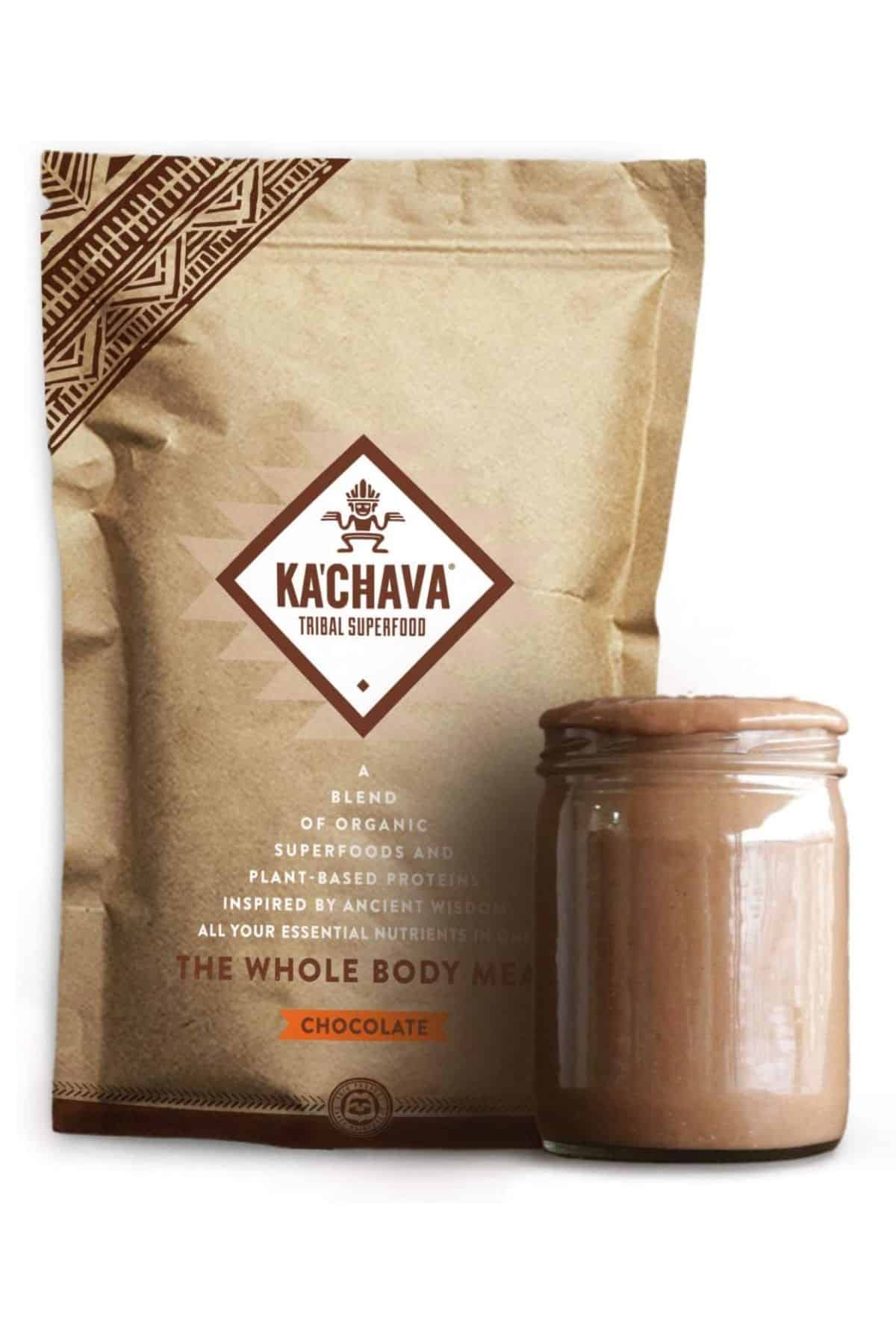
Ka’chava Facts
Ka’chava is a ready-to-go-meal powder made with a blend of plant-based proteins and organic superfoods. The company calls it a “whole-body meal” protein shake.
Note: this review was not sponsored; all opinions are my own.
The brand was launched by Simon Malone, who wanted to find a healthy alternative to eating unhealthy fast foods. He aimed to help people “who are too busy to prepare healthy meals”.
The nutrition label of Kachava shake states that it contains:
- A plant-based protein blend consisting of five proteins
- A fiber blend of four ingredients
- Nine super-fruits
- Six adaptogens
- 17 super-greens
- Three probiotic/prebiotics
- Five digestive enzymes
Besides the superfood blends and other highly nutritious ingredients, Ka’chava meal replacement shakes also contain coconut milk, natural flavoring, vegetable fiber, xanthan gum, guar gum, and Lo Han fruit extract. The chocolate-flavored Ka’chava shakes also contain natural flavors including cinnamon and cocoa.
Ka’chava is vegan, dairy-free, gluten-free, and soy-free and does not contain any preservatives or artificial colors, flavors, or artificial sweeteners.
Many of its ingredients are organic, and there is one allergen warning on the Ka’chava nutrition label; it contains tree nuts (coconut.)
Main Ingredients
This product contains over 85 superfoods, nutrients, essential vitamins and plant-based ingredients.
Let’s take a closer look at some of the key ingredients in Ka’chava in this review so you can decide if this product is healthy for you or not.
Plant-Based Protein Blend (Including Sacha Inchi)
The five plant-based proteins are yellow pea protein, brown rice protein, sacha inchi, amaranth, and quinoa. These ingredients are plant-based protein sources and can help you feel fuller for longer.
Sacha inchi is a large edible seed that packs a powerful protein punch and contains other valuable micronutrients like potassium, phosphorus, magnesium, zinc, and calcium.
Sacha inchi is also high in unsaturated fat and contains phenolic compounds.
Omega Fatty Acid/Fiber Blend (Including Acacia Gum)
This blend consists of whole-grain oat, acacia gum, chia, and flax containing significant quantities of soluble fiber. Dietary fiber can help lower disease risk and help keep hunger and sugar levels in check.
Acacia gum is a soluble fiber made from the sap of an African tree. Acacia gum is also a prebiotic and has many other health benefits, including wound healing and improved gut health.
Research shows that Acacia gum can help you feel fuller for longer, which can help prevent weight gain. It forms a gel in the stomach, which delays digestion, and controls hunger between meals (this can be helpful for weight management).
Antioxidant/Super-Fruit Blend (Including Camu-Camu and Maqui Berry)
The nine ingredients in this Ka’chava shake blend all contain antioxidants and many other essential nutrients.
Studies have shown that the Camu Camu berry has potential health benefits. It contains significant quantities of vitamin C and has anti-inflammatory and oxidative capabilities.
Maqui berry is a super-fruit rich in anthocyanins and high in bioavailability. It is a potent natural anti-inflammatory and antioxidant that is good for the immune system.
Adaptogen Blend (Including Maitake and Shiitake Mushroom Mycelia)
The adaptogen blend contains maca, ginger, and various nutrition-rich mushroom mycelia.
According to research, adaptogens can help the body resist multiple stress factors and play an essential role in human health.
Maitake and shiitake mushroom mycelia have powerful immune-enhancing effects. This combination is also excellent for gut health and digestive health.
Probiotic/Prebiotic Blend (Including Inulin)
The probiotics Lactobacillus Rhamnosus and Lactobacillus Acidophilus contained in this blend are important for gut health because they maintain or improve the good bacteria in the body.
Inulin is a potent prebiotic which helps keep the gut microbiome and gut bacteria balanced by feeding it.
Learn more about the best gut healing foods especially if you are on a leaky gut diet.
Digestive Enzyme Blend (Including Lactase)
In the Kachava digestive enzyme blend, the amylase, protease, cellulase, lactase, and lipase help the body break down proteins, fats, and carbohydrates from food. It improves nutrient absorption.
Lactase helps to digest lactose, a sugar found in dairy products.
Nutrition Pros
Ka’chava is packed with more than 85 highly nutritious ingredients.
It is free from animal products, gluten-free, soy-free, and does not contain any preservatives or artificial colors, flavors, or sweeteners.
The impressive list of high-quality ingredients in Ka’chava includes some of the world’s most popular superfoods which may improve overall health.
One serving also has 25 grams of protein which is all plant protein (so it’s appropriate for a vegan diet).
With only one allergy warning (tree nuts), Ka’chava should be safe for most people, even those with lots of dietary restrictions.
Nutrition Cons
Let’s get into some of the drawbacks in this Ka’chava review.
Although Ka’chava contains several super healthy ingredients, it’s not 100% organic and contains ingredients that can be problematic for people with food sensitivities. Some people are sensitive to flax, which can cause bloating, gas, stomach pain, and nausea.
The pea protein in Ka’Chava may cause a reaction in people allergic to legumes. Pea protein also contains purines which can cause inflammation in some people and is not as bioavailable as animal protein.
So, there can be side effects for some people after using Ka’chava including digestive distress and inflammation.
Another downside of this product is that it is expensive! You could make a superfood meal replacement mix at home with fewer ingredients for the same results and less expense. See my unprocessed food list for inspiration.
Lastly, one bag has only 15 servings and each serving only contains 240 calories. Unless you are on a strict weight loss plan, this is likely not enough calories to serve as a meal replacement. Try my 1,000 calorie smoothie!
Nutrition FAQs
Ka’chava can be considered a healthy supplement for some people, especially those with busy lifestyles. It is indeed a healthier alternative to snacking on the run. Because it contains many super healthy ingredients, Ka’chava can be part of an overall healthy diet. However, making a meal replacement shake at home can be just as nutritious and a lot more cost-effective when you use simpler and fewer ingredients (see my full list of dairy-free smoothies or try my Weight Loss Smoothie recipe).
Ka’chava contains five plant-based proteins: yellow pea protein, brown rice protein, sacha inchi, amaranth, and quinoa. Each serving includes about 25 grams of plant protein.
If you are sensitive or allergic to any ingredients, Ka’chava could cause digestive distress or other symptoms.
Some of the ingredients in Ka’chava, like quinoa, whole-grain oats, and Acacia gum, promote satiety, which could cause you to feel fuller for longer.
Ka’chava only has one allergen mentioned on the nutrition label: tree nuts (coconut.) If you’re allergic to tree nuts, it’s best to avoid Ka’chava.
Additionally, if you have a legume allergy or are sensitive to flax or any other ingredients, it’s also best to avoid this product.
Don’t Miss These Protein Powder Articles and Recipes!
Conclusions
Ka’chava is a relatively healthy product. It contains many nutritious ingredients, including plant-based proteins, a fiber blend, super fruits, super greens, adaptogens, pro- and prebiotics, and digestive enzymes. Not all of these ingredients are organic.
Although Ka’chava could be a beneficial addition to a healthy diet, more than 240 calories per serving is needed to be considered a healthy meal replacement. You could make a smoothie at home for a lot less money.
Don’t Miss These Protein Product Reviews!
Don’t forget to join my newsletter list to get exclusive clean eating recipes and tips. The newsletter is 100% free with no spam; unsubscribe anytime.
About the Author: Carrie Forrest has a master’s degree in public health with a specialty in nutrition and is a certified holistic nutritionist. She is a top wellness and food blogger with over 5 million annual visitors to her site. Carrie has an incredible story of recovery from chronic illness and is passionate about helping other women transform their health. Send her a message through her contact form.
Note: this post is for informational purposes only and is not intended as medical advice. Please consult your healthcare provider for recommendations related to your individual situation.


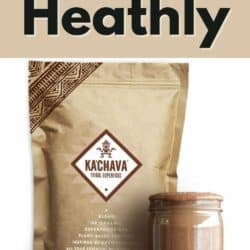
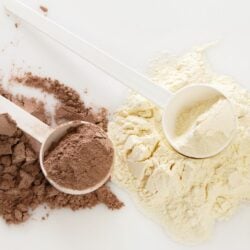


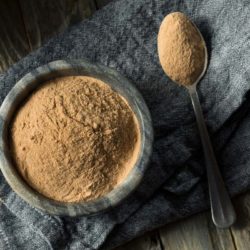

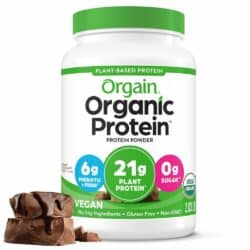
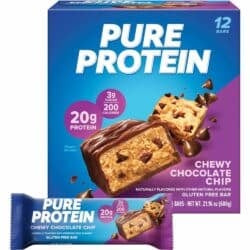
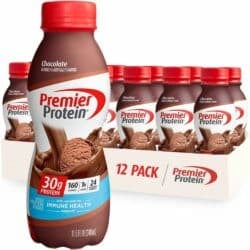


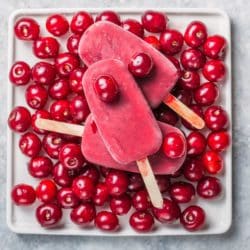

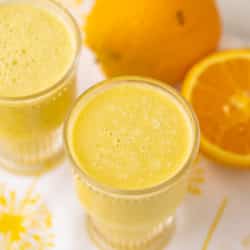
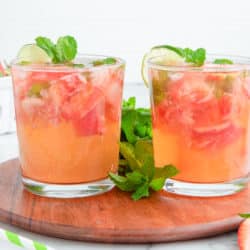








I just came across this product on FB. Many comments asking if it’s a meal replacement, and the company is replying that it is NOT a meal replacement.
I’d love to try the sample pack, but you cannot order it unless you 1st subscribe. This seems off to me. If a company believes their product is super healthy, delicious and beneficial then why won’t they let people try it without 1st subscribing?
Sounds like the not-enough-calories-to-be-a-meal non-problem could easily be overcome just by adding some nut butter and using almond milk instead of water. I’ve tried it, and it adds another 150-200 calories.
Right but you could save a ton of money by just making your own smoothie from scratch. This also allows you to have more control over the quality of ingredients. To each his (or her) own!
I have noticed w/Kachaava, just like ALL meal replacements, that the pea protein I get LOTS of gas…just like when I eat real peas, which I love!
What are some of the combinations for meal replacements you suggest, please? Can you share the recipes?
Sure, I included a few suggestions at the bottom of the post (my Strawberry Protein Smoothie would be great), or you can choose from my entire smoothie list (just be sure to include a scoop of a clean protein powder other than pea protein): https://www.cleaneatingkitchen.com/category/smoothies/